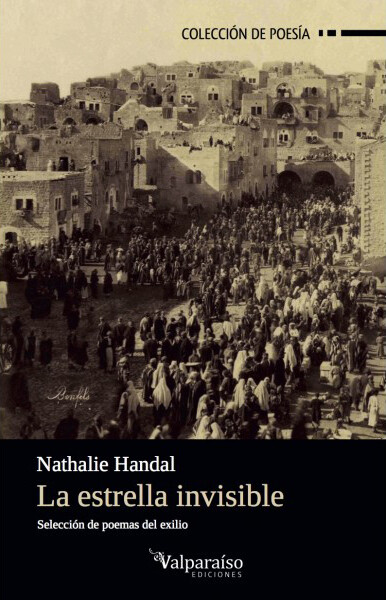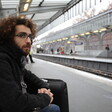The Electronic Intifada 17 September 2015

La estrella invisible: Selección de poemas del exilio (The Invisible Star: a selection of poems from exile) by Nathalie Handal (Valparaíso ediciones)
Nathalie Handal seems to have momentarily become almost ubiquitous in the field of Palestinian culture. A writer, activist and academic born in Haiti to a family from Bethlehem and raised across Europe and the Americas, Handal’s book forewords, op-eds and panel appearances are now myriad.
This collection of poems, though, reminds us of the literary talent that underpins her public profile.
On one level, these are deeply personal poems — intimate, allusive, sometimes subtly erotic. On another, though, the subtitle of the collection betrays the larger question of identity and politics which lies behind the individual experience.
Often, the two are indistinguishable, with lovers and homeland intertwined in tales of passion, betrayal and loss.
In “The Wall,” for instance, the Palestinian context lets us assume from the title and opening lines that we are reading about Israel’s wall in the occupied West Bank. Continuing through the rest of the poem, this is one possible meaning, but it is also about the barriers and confusions of a broken love affair.
Or in “Liturgy,” a hosh — the courtyard of a large Palestinian house — refers both to an actual building and to aspects of memory and emotion:
Praise the stardust on the chair
the chair in the hosh
the hosh in the heart.
A language of exile
This blending of themes of space, exile, memory and self is perhaps crystallized most clearly in the poem “Juan Rulfo, the Ghosts, the Arabs and the House.” The Spanish word for uncle — tío — is used alongside Arabic names like Walid and Toufik, and a swirling group of family members — ghosts? The products of imagination? — “were singing in Spanish/with Arabic accents”:
The last bottle of Handal Arak
was on the table
Tio Walid and Tio Toufik wondered
if opening it
would wake the others
…
and the Mexican Arabs —
Kareem, Margo and Tia Regina
arrived with clouds on their hats.
The dual-language format of this collection is also worthy of comment. Anthologies of Palestinian poetry in Arabic and English have become increasingly common in recent years — from Saqi’s Victims of a Map, which brings together the works of Mahmoud Darwish, Samih al-Qasim and Syrian poet Adonis; to Sadder Than Water, Ibis Editions’ selected works of al-Qasim; and, most recently, the multi-voice collection of A Bird is Not a Stone.
This volume, however, does something aesthetically and politically different.
Instead of Arabic, Handal’s poems are in Spanish and English, in a volume published in Spain. Specifically, and perhaps appropriately, in Granada — the last Islamic city of al-Andalus, the series of kingdoms in southern Spain and Portugal in which Muslims, Christians and Jews largely coexisted peacefully, for a period remarkable for its cultural production.
This makes for a different reading experience; there are probably many more readers of English who can make some sense of Spanish than those who can tackle Arabic.
But this linguistic peculiarity also makes a point: Handal is a Palestinian poet, but she writes — as the subtitle suggests — in a language of exile.
The star
Throughout the collection — and in the title itself, with its nod to the star of Bethlehem — the references to Palestine are constant. But they sit alongside other traditions, and indeed are in many cases framed within sections named after Cuba, El Salvador, Mexico or Nicaragua.
These sections named for their countries sit under the heading “Cities: The Star in Latin America.” “The Star” of Palestinian Bethlehem — whether exuberantly footloose or in a state of embittered longing — meets Hemingway’s Havana haunts, the revolutionary icons of the Americas and the Brazilian liquor cachaça.
Handal’s experiences, while just as “authentic” as those of poets born and raised in the Arab world, are profoundly different. And with their Latin American cultural references, her poems speak of a huge body of Palestinians that are rarely mentioned (it’s not widely known that the largest population of Palestinians outside the Middle East live in Chile).
As such, this collection highlights a facet of the global Palestinian diaspora which is scarcely touched upon. Handal opens a window on a large community of Palestinians with origins in its own touchstones and longings, and which, as well as being shaped by its Palestinianness, has evolved amidst the political and social tumults of other countries.
Sarah Irving is contributing arts editor to The Electronic Intifada and author of a biography of Leila Khaled and of the Bradt Guide to Palestine and co-editor of A Bird is not a Stone.






Comments
Cheers for this review. I'm a
Permalink stephen byrne replied on
Cheers for this review. I'm a big fan of Handals work and this book is new to me so thank you for the introduction.
English translation + The Blue Between Sky and Water Review?
Permalink Einar Steinn Valgarðsson replied on
Thanks for the review. Is there any English translation available of Handal's work?
Also, I'd be very happy to see an EI review of Susan Abulhawa's latest book, The Blue Between Sky and Water. Would you consider reviewing it?
Nathalie Handal's Poems
Permalink Amal Kelly replied on
Language only we can understand